Winter Wolf Read online
Page 3
Then again, a mundane, normal death was better than what waited for me if the Inquisition found out that I existed. I grimaced at the thought. Right now, worrying about the Inquisition was the least of my concerns.
I had to survive my interrogation first. Maybe, if luck decided to side with me, I’d understand why the killer had chosen a young bookstore employee instead of me.
“You can call me Detective Harding,” the cop said, starting the car after I clicked my belt into place. He paused, and there was a sickening expectation in the silence.
“Nicole Thomas,” I murmured. While all I wanted was to retreat and find a hole to bury myself in and cry, I couldn’t. I had to answer questions for the police, and I had to do so without them figuring out I wasn’t a regular human. Maybe if I focused on Scott, and poured all of my compassion into helping the police find his killer, everything would work out. And if detectives found Scott’s killer, I’d be safe.
If the mask I showed the world wasn’t perfect, if I didn’t hide myself flawlessly, I would die. The Inquisition would surely find me, if Scott’s killer didn’t come for me first.
The world believed Nicole Thomas knew nothing of the Inquisition, so I’d play that part.
He said nothing as he pulled the car out of the parking lot, leaving me to my thoughts. I glanced at the speedometer. He drove just under the legal limit, came to a complete halt at every stop sign, and signaled at every turn. He ignored the mounted laptop dominating the center console of the car, and while he listened to the dispatcher on the radio, his eyes never left the road.
Maybe it was the shock of Scott's death, but the buzz of the electronics in the police car didn't bother me too much. While the temptation to siphon way some of the energy and make it my own was there, I resisted it with little effort.
It reminded me of the feeling I had after a full day on the movie set, satiated and tired enough I didn’t need to charge the devices around me. Even my cell phone behaved, my awareness of its hunger reduced to a faint whisper in the back of my head.
We arrived at the police station, and Officer Harding parked. Before I finished unbuckling, he managed to get out and circle his car to open the door for me. I thanked him with a nod, although I couldn't quite force myself to smile.
“This way, Miss Thomas,” he ordered, gesturing to the police station. I followed several steps behind him.
I had never been in a police station before, and it took all of half a minute for me to hope I'd never have to step inside one ever again. There was something about the place, an unpleasant charge in the air. It wasn't electricity, but something else, something far more sinister.
It chilled me from the inside out.
The reception room was surprisingly sterile, with bolted-down chairs and bullet-proof glass protecting the officers from any unruly visitors who might be tempted to break into the station. A steel door guarded the back, and Officer Harding led me to it without as much as a glance at his fellow cops or the few waiting.
Those people, I noticed, were in handcuffs. All of them, except for a wild-eyed woman wearing bedraggled designer rags, were Hispanic. I didn't have long to stare, wondering at the unfairness of so many white cops delivering judgment on others. When I hesitated, Officer Harding seized my elbow, dragging me down a hallway and into an elevator.
He selected the second floor. We rode in silence, broken only by the whirr of the elevator and the metallic swish as the door opened.
Hallways, apparently, were commonplace in police stations. I could hear the muted murmur of conversations behind pairs of closed doors. To my surprise, the doors were made of glass, allowing me to see where pairs of cops were questioning people.
Through the first door, I recognized Laura, who spoke energetically to a pair of women.
“These are our questioning rooms. We use them to talk to witnesses and suspects, so they can have privacy. As you can tell, they're sound proofed, so no unauthorized individuals will be able to listen to our discussions,” Harding said, gesturing towards the room Laura was in.
I expected I would be questioned, over and over again, until I was sick of repeating myself. I'd seen enough cop shows on TV to have at least some idea of what to expect. It was easy for me to imagine an overbearing detective towering over the victim seated on one of those uncomfortable chairs as they were interrogated. I struggled against my growing unease as I was led down the hall. It opened up to a glass-shielded room full of cubicles and police officers.
Officer Harding opened the door at the end of the hall and gestured me inside. The room had an empty, unwelcoming feel to it, furnished with a dull metal table and three folding chairs, more plastic than metal. I said nothing, but nodded to acknowledge that I had seen his gesture.
When the detective left me alone, I systematically emptied my pockets, pulled out my ID, and waited in silence. Pacing like a caged animal wouldn't help anything, although it may have helped diffuse the restless energy building up within me. Once again, I was aware of the thrum of electronics. A hidden camera nestled in one corner near the ceiling. The intercom devoured electricity, surprising in its hunger. Several smaller devices littered the walls, though I couldn't guess what they did.
The temptation to lash out and blow out all of the devices surged within me. I placed my palms on the smooth surface of the table, splayed my fingers, and drew ten deep breaths until the desire subsided.
A police station was the last place I wanted to stretch my wizardly legs and cause trouble. For all I knew, Inquisitors served as police. Sobered by the thought, I stared down at the tabletop, reined in my impulses, and waited.
~~*~~
Time was supposed to be a steady constant; the duration of a second simply did not change. My perception of time, however, was a fluid thing. For a while it flew by, whipped along by the frantic beat of my heart. Then, as if accepting the inevitability of a lengthy wait, it slowed. Seconds, minutes, or even hours didn't matter. It slogged along with the same lethargy of molasses in winter.
Worse, I was alone. Silent company would’ve helped me accept that I wasn’t the only one suffering from Scott’s death. It consumed me, gnawing away at my sanity with each passing moment. I couldn't escape the memory of his final moments or the sensation of his dried blood cracking on my skin. I didn't dare take off my sweater although I wore a tank top underneath.
They would question my scars. Maybe the Inquisition wouldn’t realize the cause of them, but I couldn’t afford the risk. If they asked about them, I would have to lie, and if I lied, they might learn the truth. Then Scott’s killer wouldn’t need to worry about me at all.
My eyes burned with unshed tears, but none fell. As if mocking me, my stomach gurgled, aching with primitive need. Food gave the body the strength to heal, to cope, and to survive, but the last thing I wanted was a reminder I lived. Why had the murderer chosen Scott? I had been so close to him. It wouldn’t have cost the killer any effort to target me instead.
Yet I had lived, and Scott had died.
But why Scott?
The lights flickered overhead, and I stared up at the ceiling. Out of habit, I focused on my burdensome power, but the lights continued to dim and brighten. It wasn’t me. I sucked in a breath, my eyes widening.
The lights in the bookstore had flickered from frequent power outages. Could Scott have been a wizard like me? Had his death been caused by the Inquisition?
I shuddered. The Inquisition was a lot of things, but from what I understood, they preferred a gun in an alley or a knife in a dark, not such a public murder. Everything I had read about the Inquisition implied they avoided attention, and that was why I still lived. Like them, I didn’t want to be found.
If Scott had been new to his powers and hadn’t known how to control himself, the Inquisition would’ve found him, of that I had no doubt. I had been lucky. I had known about the Inquisition before I had become a wizard, all because of my family’s tainted nature. The rest I had learned from a book.
&n
bsp; Homesickness was a funny thing. Home wasn’t something I’d thought of in a long time. I had abandoned it. I didn’t have a right to feel the melancholy of wanting something that was on the other side of a bridge I had set torch to and watched burn. Home was a place where I had a mother, a father, and a twin sister. In our own way, we had been happy.
But knowledge had changed everything. While I didn’t exactly understand the relationship between the Fenerec and the Inquisition, I knew they would kill me if they found out I existed. That awareness had saved my life when I had lacked control. It had spurred me to learn to control myself before I was discovered, allowing me to hide in the open.
If Scott had been a wizard, he hadn’t been as lucky.
The door burst open and Officer Harding swept into the room. I squeaked, clapping my filthy hands to my mouth to mask the sounds of my fright. Another cop followed him, a young woman who looked fresh out of high school, let alone old enough to serve as a member of the police force.
Harding slapped down a thin manila folder, and sat down next to me. “This is Detective Faraday.”
Detective Faraday didn’t quite sigh although I suspected she wanted to. A wrinkle creased her brow, and there was nothing friendly about the way she glared at Harding before circling the table to take the chair opposite me. She made an effort to smile at me as she sat.
“Identify yourself,” Harding barked, pulling the folder to him. His hand hovered over the tab, poised to flip it open.
“My name is Nicole Thomas.”
“Occupation?”
“Actress.”
Harding flipped open the file. There were several pages within. On the top was a sheet of paper with four photographs clipped to it. He removed one and slid it in front of me. “Do you know these people?”
I obediently stared down at the picture in front of me.
Four boys sat around a table, papers, dice, and pencils strewn between them. There was one empty seat waiting for someone to return to it. Scott had been laughing when the photo had been taken, pointing at a little figurine of a robed man. The others with him were grinning. It was the perfect picture, capturing unrestrained joy.
I wondered if the person who had been behind the camera had been laughing, too.
After staring at Scott, hoping the happy moment would somehow erase his last ones, I inspected the other boys.
To my surprise, I recognized one other than Scott. “I know two people in this picture,” I replied.
“Two?” Harding leaned towards me, his gaze intent. I flinched away, watching him out of the corner of my eye.
“Two,” I confirmed, pointing at Scott. “His name was Scott. He… he was the one who died.”
A lump formed in my throat and I swallowed it back.
Silence answered me. Maybe they meant to give me a moment to collect myself, mistaking the crack in my voice for emotion instead of my chronic laryngitis. The photograph hurt, but their questions hadn’t hurt me—not yet.
That would come soon enough.
I took advantage of the quiet to study the woman seated across from me. Faraday’s eyebrows rose, but then her expression smoothed to a cool, impassive mask.
There were many types of women, and in my career, I had met most of them. Some moved along with the flow of others, shapeless in their personalities and appearances, fitting whatever role life happened to throw at them. Others forged their own paths, plowing through anyone who happened to get in their way.
Then there were those who were somewhere in between, wolves in sheep’s clothing, who didn’t quite know how to stop being prey and start becoming a predator. The detective’s eyes focused on me, and for a moment, all I could see was a suppressed wolf who wanted to break free of a dominant male.
Maybe my sister’s tainted nature had infected me, considering people as beasts rather than humans. Then again, I was a wizard; ‘human’ wasn’t a label I could apply to myself. Part of me hoped the detective would break her chains and speak.
It didn’t surprise me when Faraday remained silent.
“And the other?” Harding prompted.
I pointed. The boy had more orange than red in his hair, and he had the pasty white skin of the Irish. His dark brown eyes were warm, as was his smile. “I don’t remember his name, but I’ve seen him at a studio before.”
Maybe Harding practiced his intense glares in a mirror. His expression was calculating, waiting for me to make a mistake. “Studio?”
“Movie studio. Place is called Silver Moon. They shoot genre flicks.” I wrinkled my nose. “B-rated stuff. He ran errands. I didn’t know him well, just enough to remember seeing him around.” I frowned, letting my brow furrow as I thought about it. “Maybe two or three years ago. Worked with the sound crew, if I recall correctly.”
I did; my memory wasn’t kind to me, and I had a tendency to remember far more than I should. That, however, they weren’t going to find out if I had any say in the matter. Dates, unfortunately, didn’t tend to stick as well as the other little details—like the blood splatters on the bookstore’s white walls.
Harding’s eyes narrowed. I imagined him preparing to pounce at me to get the answers he wanted. “Two or three years ago?”
“I don’t remember exactly,” I replied with an apologetic shrug. Time was a luxury on set, and extras were expected to show up, do their job, and leave. Dates of shoots weren’t all that relevant, so long as I showed up on time. “I had been in a lot of films around then, in minor roles.”
“Minor roles?” Harding’s eyes narrowed. I shivered at the predatory nature of his stare.
What had I said to prompt such a reaction? It was common knowledge extras participated in many films. At least, I thought it was. I shrugged, and decided if I wanted to escape unscathed, I needed to play along.
They couldn’t catch me in a lie if I spoke nothing but the truth.
“With my voice, I don’t get many lead roles,” I admitted.
“You don’t have a cold?” Faraday asked, her tone surprised.
“No. Chronic laryngitis.” I paused, gauging their reaction. Both recoiled. Harding recovered first, his eyes narrowing with suspicion. Sympathy was something I wouldn’t expect from him, but Faraday at least faked a little bit of concern and sympathy. “It isn’t contagious.”
“How long have you been ill?” Harding asked.
Too long was the truth, but I couldn’t bring myself to say that. “Four or five years now, I guess? Maybe longer.”
Harding pounced on my hesitation. “You guess?”
“I thought it was allergies at first,” I admitted, biting my lip. “But it didn’t get better. I didn’t really think about it until I found out it wasn’t allergies after all.”
“I see.” Whipping a pen out of his pocket, Harding flipped through the pages and wrote a note. “So you worked with this boy for how long without knowing his name?”
Patience was a virtue, and a good actress didn’t let repeated questions faze her. I reminded myself of that several times. “Do you know the name of every janitor who works here?” I asked, cocking my head to the side as I met his eyes. I had nothing to hide—excluding my death-sentence crime of wizardry, of course.
But I, a failed actress and retired singer, wasn’t supposed to know anything of wizards, witches, Fenerec, or the Inquisition. If Harding or his partner were Inquisitors, I couldn’t risk revealing any knowledge at all about anything unusual.
Splotches of red appeared on Harding’s cheeks. “That isn’t relevant. Answer the question.”
Hiding wasn’t possible and acting like a cornered animal would bring me nothing but harassment from the detectives. In my current role, I had nothing to hide from them, and I couldn’t let myself be stepped on. It was like an audition; if I wanted to act, I needed to believe I was worthy of my part. I needed, as always, to pretend to be someone else—someone who wasn’t shaking, sickened, and the most likely suspect of a murder I hadn’t committed. It was hard not to duck my head.<
br />
“I was an extra, sir. I haven’t featured in a film produced at that studio. I don’t know the names of every single sound crew member. I don’t know how many days I had been at the studio. No more than a week. It was a minor role.”
Most of my roles were, but he didn’t need to know that. I didn’t have a police record, so it was unlikely that they knew much about my career, although they would have had plenty of time to research my appearances if they had really wanted.
Harding tapped the photograph, gesturing to Scott. “And him?”
“He’s an employee at the bookstore. He helped me find a book tonight.”
“Have you ever seen him prior to tonight?”
I shook my head. “No.”
“Why were you at the mall?”
Patience, I reminded myself. “I was buying a book.”
“Which book?”
Instead of answering, I gestured to my bloodstained copy of Among Us. Harding glanced at it. “Why that book?”
“You’d have to ask my agent that, sir. He asked me to read it.”
“Your agent,” Harding stated in an unamused, dry tone. “For a sub-par actress with a focus on minor roles?”
There were times I really, really wanted to unleash every bit of my power and burn someone to ash. I had to rein in the impulse. It took me several deep breaths and a moment of imagining fluffy kittens playing with yarn to control my desire to fry the man.
I guessed they had taken the time to look up my credits as an actress while I waited.
Settling with the most direct, simplest answer I could think of, I replied, “Yes.”
Detective Faraday’s eyes widened. A smirk twisted Harding’s lips before he controlled himself. “Why?”
“You would have to ask him that, Detective Harding. I don’t know.”
“You didn’t ask him?”
“I had no reason to ask him. I assumed he had an audition in mind and would tell me when the time came.”
“Why?”
I didn’t have an answer for him, so I shrugged. “You would have to ask him, Detective Harding. I can give you his number, if you’d like.”

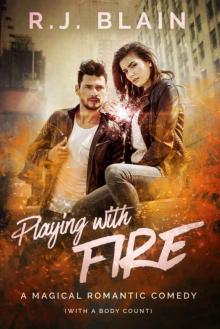 Playing with Fire: A Magical Romantic Comedy (with a body count)
Playing with Fire: A Magical Romantic Comedy (with a body count)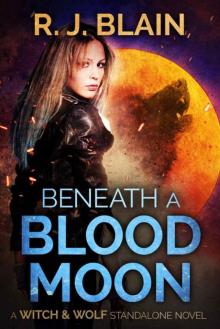 Beneath a Blood Moon
Beneath a Blood Moon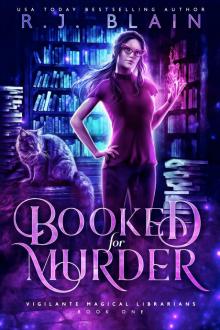 Booked for Murder
Booked for Murder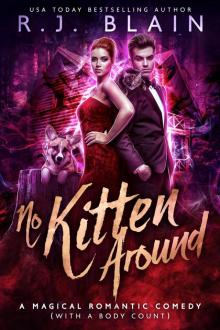 No Kitten Around
No Kitten Around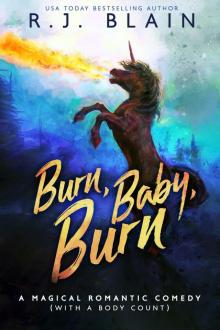 Burn, Baby, Burn
Burn, Baby, Burn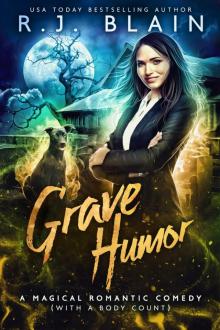 Grave Humor
Grave Humor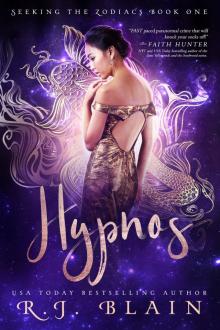 Hypnos
Hypnos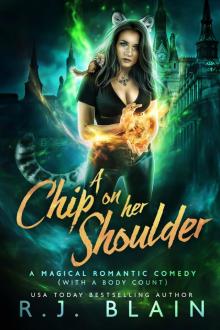 A Chip on Her Shoulder
A Chip on Her Shoulder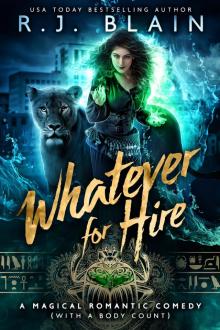 Whatever for Hire
Whatever for Hire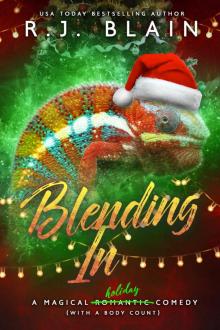 Blending In
Blending In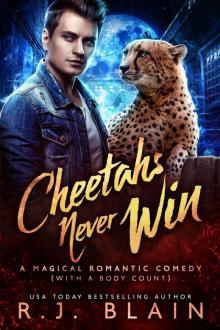 Cheetahs Never Win
Cheetahs Never Win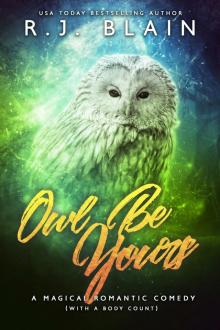 Owl Be Yours
Owl Be Yours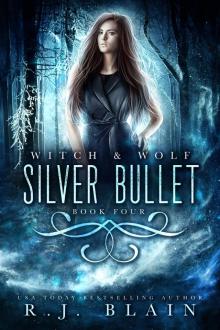 Silver Bullet
Silver Bullet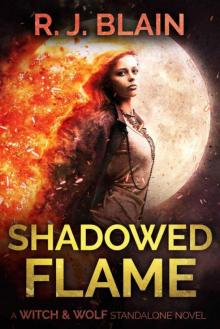 Shadowed Flame
Shadowed Flame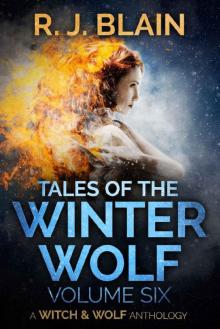 Tales of the Winter Wolf, Vol. Six
Tales of the Winter Wolf, Vol. Six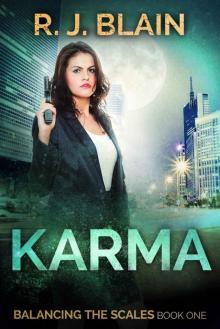 Karma (Balancing the Scales Book 1)
Karma (Balancing the Scales Book 1)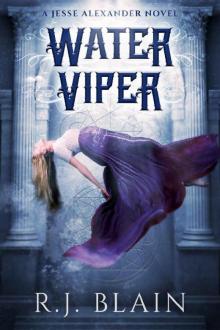 Water Viper: A Jesse Alexander Novel
Water Viper: A Jesse Alexander Novel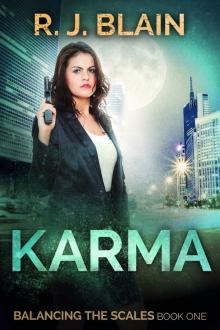 Karma
Karma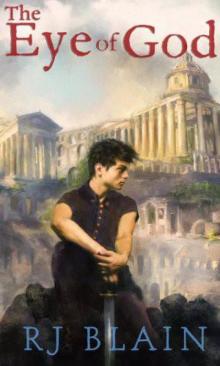 The Eye of God (The Fall of Erelith)
The Eye of God (The Fall of Erelith)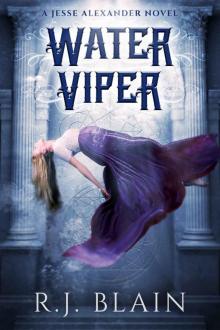 Water Viper
Water Viper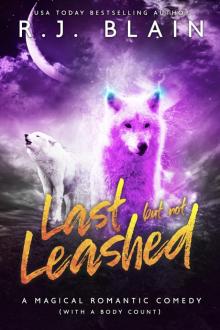 Last but not Leashed
Last but not Leashed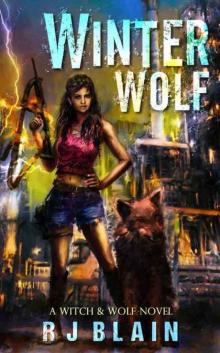 Winter Wolf
Winter Wolf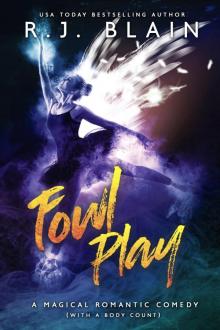 Fowl Play
Fowl Play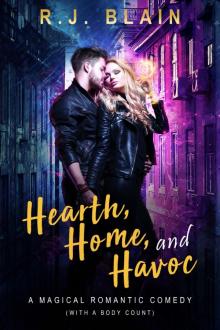 Hearth, Home, and Havoc
Hearth, Home, and Havoc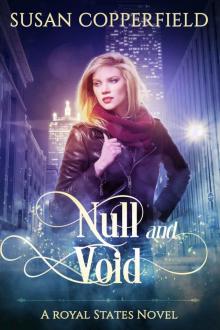 Null & Void_a Royal States Novel
Null & Void_a Royal States Novel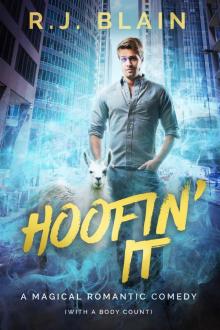 Hoofin’ It: A Magical Romantic Comedy (with a body count)
Hoofin’ It: A Magical Romantic Comedy (with a body count)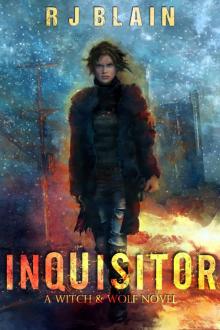 Inquisitor (Witch & Wolf Book 1)
Inquisitor (Witch & Wolf Book 1)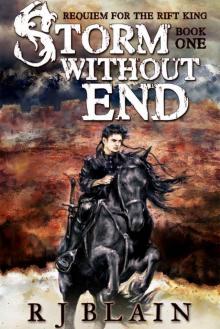 Storm Without End (Requiem for the Rift King Book 1)
Storm Without End (Requiem for the Rift King Book 1)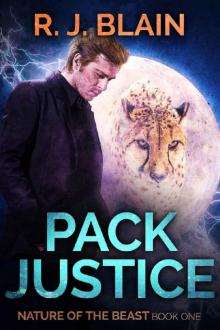 Pack Justice (Nature of the Beast Book 1)
Pack Justice (Nature of the Beast Book 1)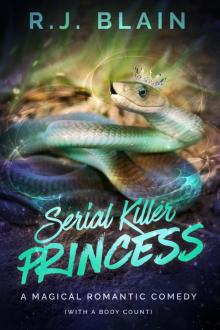 Serial Killer Princess
Serial Killer Princess